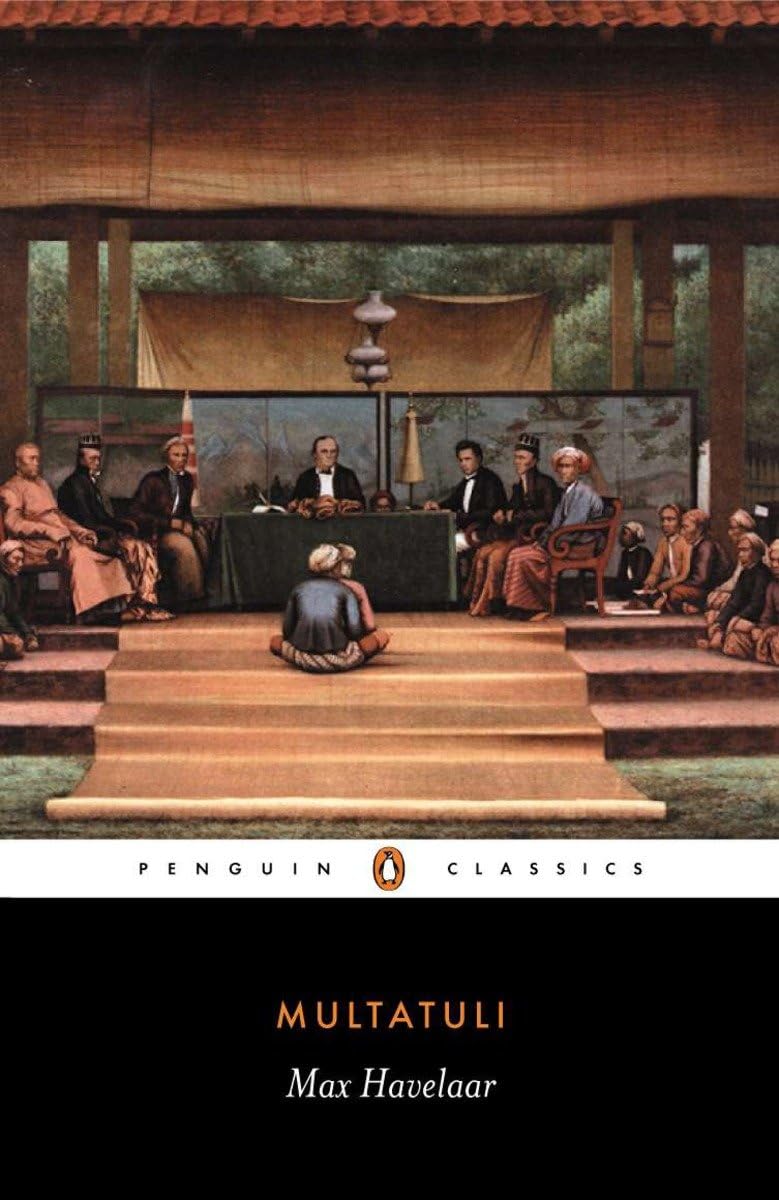Max Havelaar
Max Havelaar is backordered and will ship as soon as it is back in stock.
Couldn't load pickup availability
Genuine Products Guarantee
Genuine Products Guarantee
We guarantee 100% genuine products, and if proven otherwise, we will compensate you with 10 times the product's cost.
Delivery and Shipping
Delivery and Shipping
Products are generally ready for dispatch within 1 day and typically reach you in 3 to 5 days.
Author: Multatuli
Brand: Penguin
Color: Black
Edition: Reissue
Binding: paperback
Number Of Pages: 352
Release Date: 01-09-1995
Part Number: 9780140445169
Details: Product Description
One of the most forceful indictments of colonialism ever written and a masterpiece of Dutch literature, in an esteemed translation by an award-winning translator
Max Havelaar—a Dutch civil servant in Java—burns with an insatiable desire to end the ill treatment and oppression inflicted on the native peoples by the colonial administration. Max is an inspirational figure, but he is also a flawed idealist whose vow to protect the Javanese from cruelty ends in his own downfall. In
Max Havelaar, Multatuli (pseudonym for Eduard Douwes Dekker) vividly recreated his own experiences in Java and tellingly depicts the hypocrisy of those who gained from the corrupt coffee trade. Sending shockwaves through the Dutch nation when it was published in 1860, this damning exposé of the terrible conditions in the colonies led to welfare reforms in Java and continues to inspire the Fairtrade movement today.
Roy Edwards’s vibrant translation conveys the satirical and innovative style of Multatuli’s autobiographical polemic. In his introduction, R. P. Meijer discusses the author’s tempestuous life and career, the controversy the novel aroused, and its unusual narrative structure.
Amazon.com Review
When
Max Havelaar was first published in Holland in 1860, it ignited a major political and social brouhaha. The novel, written by a former official of the Dutch East Indian Civil Service under the pen name Multatuli, exposed the massive corruption and cruelty rife in the Dutch colony of Java.
Max Havelaar is an undeniably autobiographical novel; like his hero, Multatuli--the pseudonym for Eduard Douwes Dekker--was an Assistant Resident of Lebak in Java; like Havelaar in the novel, he resigned his position when his accusations of corruption and abuse were disregarded by higher authorities, resulting in years of poverty for both author and fictional hero.
Max Havelaar is told from several different perspectives; the reader first meets an Amsterdam coffee dealer named Droogstoppel, a man so obsessed with coffee that his every thought and action is governed by it. Droogstoppel has come by a manuscript from an old schoolmate who, down on his luck, has asked him to get it published. The schoolmate is Havelaar, and the manuscript relates his experiences as an idealistic and generous young civil servant who tries to protect the poor and bring justice to the powerless.
The central part of the novel details conditions in Java, particularly Havelaar's efforts to correct injustices in the face of a corrupt government system. That his efforts will prove futile soon becomes apparent, and there is something almost Greek in the inevitability of Havelaar's declining fortunes. Despite its tragic themes, Max Havelaar is savagely funny, particularly the chapters narrated by Droogstoppel, a character unmatched for his veniality, narrow-mindedness, or singular lack of understanding or imagination. Though Multatuli's masterpiece is nearly 150 years old, it wears its age well, and Roy Edwards's excellent translation offers English-speaking readers a wonderful opportunity to experience one of the Netherlands's great literary classics.
Review
“A literary masterpiece of the first order.”
—R. P. Meijer, from the Introduction
About the Author
Multatuli (1820–1887) was the pseudonym of Eduard Douwes Dekker. He was born in Amsterdam, the son of a Dutch sea captain. In 1838 he went to the Indies and joined the East Indian Civil Service. Despite being involved in various disputes with his superiors, his outstanding abilities were recognized and he rose steadily in rank. He married Everdine, Baroness van Wijnbergen, in 1846 and they had two children. Increasingly unable to accept the brutalities of colonial rule, he resigned from the service in 1856. Years of poverty followed, during which he wandered around Europe, struggling to survive by his writing and endeavoring to improve the situation of the Javanese.
Max Havelaar, his powerful indictment of c
EAN: 9780140445169
Package Dimensions: 8.1 x 5.0 x 1.0 inches
Languages: English, Dutch





